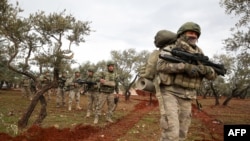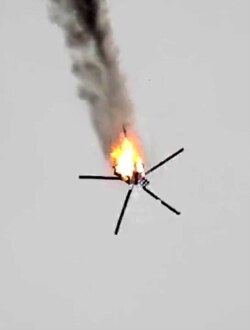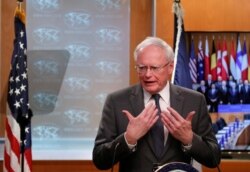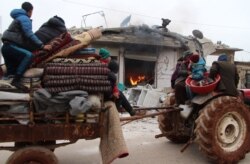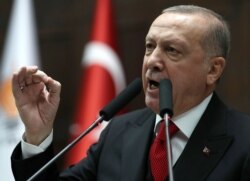Turkey is deploying tanks and armor in Syria’s Idlib province as Damascus continues its offensive against the last rebel enclave. But in an apparent gesture to Moscow, Ankara is pledging to crack down on radical elements in Idlib, along with calls for “a lasting cease-fire.”
Damascus’s forces are claiming they are advancing against the rebels’ last stronghold. But in a sign of the intensifying fighting, rebels claimed to have to shot down a Syrian government military helicopter Friday, the second this week.
Ankara reportedly is stepping up its arming of rebels with sophisticated anti-aircraft and anti-tank weapons, along with deploying hundreds of armored vehicles and tanks.
The escalating military presence follows Turkish President Recep Tayyip Erdogan’s vow to drive back Damascus’s forces from Idlib if they don’t withdraw by the end of February. The ultimatum followed the killing of 14 Turkish soldiers this month by Syrian troops.
However, Turkish Defense Minister Hulusi Akar appeared to strike a different note Thursday, pledging to crack down on radicals in Idlib. Akar said they would be “dealt with by force” and that “all measures” would be considered against them.
The Turkish defense minister was referring to the group Hayat Tahrir al-Sham, which Damascus forces are battling in Idlib. The radical group is now a mainstay of rebel groups in Idlib.
Moscow blames Ankara for the Damascus offensive, claiming it had failed to disarm and remove radical groups as part of a 2018 Sochi agreement aimed at creating a de-escalation zone in Idlib.
“The Turkish side had taken upon itself an obligation to neutralize terrorist groups” in Idlib, said Kremlin spokesman Dmitry Peskov Friday.
Blame game
Erdogan had dismissed Moscow’s calls to disarm radical groups, claiming the Russians were responsible for the Idlib fighting, in an increasingly acrimonious blame game.
Washington, sensing an opportunity to create a disagreement between Ankara and Moscow, strongly backed Erdogan’s stance in Idlib. U.S. Secretary of State Mike Pompeo dispatched Ambassador Jim Jeffrey for emergency talks Wednesday. Jeffrey, speaking to reporters Tuesday ahead of negotiations, appeared to suggest every kind of support would be considered, stoking Ankara’s hopes of military support.
U.S. National Security Adviser Robert O’Brien appeared to rule out such a move Wednesday, however, asking, “What are we supposed to do to stop that? We’re supposed to parachute in as a global policeman and hold up a stop sign and say stop this, Turkey? Stop this, Russia? Stop this, Iran? Stop this, Syria?”
A slap at Washington
Turkish pro-government media were quick to hit back Friday against Washington, accusing its NATO ally of duplicity.
“James Jeffrey’s deceit can clearly be read on his face. He is running wild at the peak of insolence. Who can call him human,” wrote columnist Taner Korkmaz of the Turkish daily Yeni Safak.
Turkish Chief of Staff Yasar Guler spoke Thursday with his Russian counterpart, General Valery Gerasimov, about the situation in Idlib, the Turkish military announced on Twitter.
“Erdogan is still a pragmatic man. He still thinks he can win. He can persuade Putin to give him some favors in Syria,” said analyst Atilla Yesilada of Global Source Partners.
Turkish Foreign Minister Mevlut Cavusoglu is scheduled to meet his Russian counterpart, Sergey Lavrov, Sunday on the sidelines of the Munich Security Conference.
No refugee exodus
International relations expert Soli Ozel of Istanbul’s Kadir Has University says Ankara could be looking to Moscow to save the 2018 Sochi agreement based on rebels giving up territory.
“The best solution is for the Turkish military to withdraw north of the M4 and leave the two highways to the regime,” Ozel said. “And the regime will send a couple of hundred thousand refugees, and we will be stuck with them, at least not in Turkey.”
Ozel claims Erdogan’s priority in Idlib is to avert another significant exodus of refugees into Turkey, given the country is hosting of 3.5 million Syrians from the civil war.
The United Nations said Thursday more than 800,000 Syrians had been displaced by fighting in Idlib, with 64,000 sleeping outside and another 14,000 under trees in sub-freezing temperatures. Many reportedly are moving toward the Turkish border.
“The level of tolerance of Turkish society for an extra number of Syrians is zero,” Ozel said. “It would generate a lot of tensions. I would be very concerned with inter-communal violence through the vilification of the Syrians, and it would be a pretty precarious situation, I think.”
Sliding economy
A slowing economy is exacerbating Turkish discontent over Syrians, with youth unemployment at nearly 25%. Erdogan’s ratings in opinion polls, along with his AKP, are on the slide.
Analysts also warn of a potential security threat of an exodus from Idlib, given the presence of large numbers of jihadists.
“These radical elements can easily escape into areas of large concentrations of Syrian nationals. In some places, Syrians in Turkey are the majority,” said Haldun Solmazturk, head of the Ankara-based research group the 21st Century Turkey Institute. “If these groups feel betrayed by Turkey, they could use terrorist methods against Turkey,” Solmazlurk said.
Ankara already is seeking to curtail the threat of a new refugee exodus. “They are building in a band within 30 miles of the Turkish border, thousands of temporary houses,” Yesilada said.
“Which means that if [Syrian leader Bashir al-] Assad wishes to take them back, Turkish military forces will defend those settlements? [German Chancellor Angela] Merkel has reportedly vaguely promised to help finance those settlements. But would these people stay in such settlements with Assad breathing down their necks,” he added.




